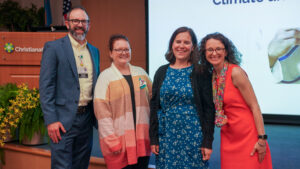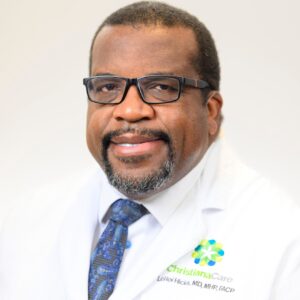With a new name, Christiana Care’s long-running HIV program continues to expand its mission to care for people with HIV and hepatitis C, leveraging partnerships and educating the community about prevention.
Now named the William J. Holloway, M.D., Community Program, the program has served people with HIV since 1986. Originally called the Christiana Care HIV Program, it began as a series of clinics and has evolved with medical advances and shifts in the population it serves.
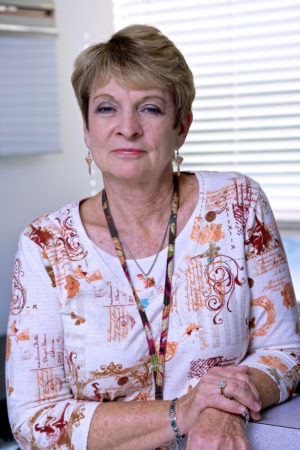
“In the beginning, patients were very sick. Patients were dying,” said Arlene Bincsik, MS, RN, CCRC, ACRN, program director, who has worked with the program since its inception. “As a health care professional, to see HIV go from a disease that is 100-percent fatal to a manageable chronic disease is nothing short of amazing.”
In 2015, the program began treating patients with hepatitis C, a blood-borne virus that causes inflammation of the liver and can lead to liver failure. Thanks to new drugs, hepatitis C can now be cured.
The program’s new name is a tribute to one of its founders. William J. Holloway, M.D., was the driving force behind establishing a program focused on patients with HIV. Although he was nearing retirement, Dr. Holloway kept working to found the HIV clinic.
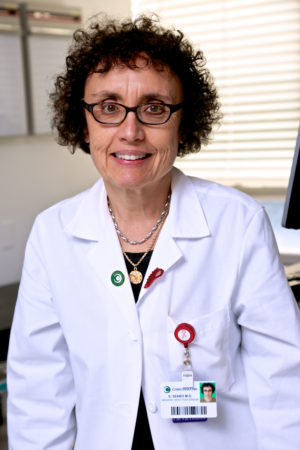
“He is considered the grandfather of infectious disease in Delaware, very knowledgeable and kind to both patients and the staff,” said Susan Szabo, M.D., medical director of the program.
The Holloway Community Program is multidisciplinary, with a staff comprising experts in infectious disease, internal medicine, family medicine, obstetrics and gynecology, psychiatry, social work and peer education.
With clinical sites in New Castle, Kent and Sussex counties, the program provides services to a growing number of patients. In 2017, 1,717 HIV-positive patients received care during 11,959 visits. More than 2,500 patient visits were to the team’s pharmacists, who play an essential role in educating patients.
“Our Pharm.D.’s do assessments with patients as to what type of medications fit into their lifestyle and talk to them about side effects,” Bincsik said. “They participate in rounding, educate the staff and add tremendous value to the patients and to our team.”
The Holloway Community Program is the only site in Delaware designated as a Ryan White center, part of a federal program for receiving and distributing antiretroviral medications that help people with HIV to manage their disease. The program often is the sole source of treatment for patients without insurance.
“It means that everyone who needs treatment has access to treatment,” Bincsik said.
Patient relationship ‘key to everything’
About 80 percent of patients rely on the program as their sole source of primary care, Dr. Szabo said. Care for patients is individualized, with some patients coming in weekly so the staff can help them manage their medications. The staff also helps in addressing patients’ food, housing, transportation and behavioral health needs.
“We have patients we have taken care of for more than 20 years,” Bincsik said. “Our relationship with our patients is key to everything.”
Josh Sheets is one of more than 200 patients who receive care at the Kent Wellness Center in Smyrna. Sheets, 30, has relied on the center to provide expert, respectful care since his HIV diagnosis five years ago.
“It’s the only place I have gone for HIV care,” Sheets said. After his diagnosis, a social worker helped him to establish eligibility for the Ryan White program.
“He also provided me with handouts for good nutrition and the importance of getting regular care,” he said. “I had a great first experience there, so I kept coming back.”
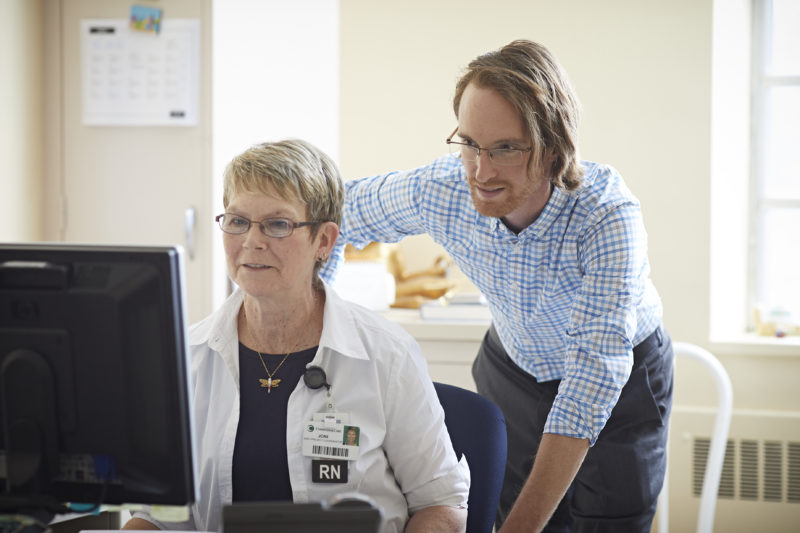
It took about a year to get his medications just right. For the past four years, his virus has been undetectable. Sheets leads an active and productive life, working at his job as a medical case manager for the Delaware HIV Consortium. He hikes and backpacks — “the things I love,” he said. Twice a year, he comes to the center for checkups and lab work.
“I truly cherish that they take their time,” he said. “They aren’t standing with their hands on the exam door. They want to know your needs so they can better serve you. If you need something, just ask.”
The caseload in Smyrna increased about 20 percent in 2017, when the center saw increased hepatitis C (non-HIV) visits and added primary care services.
Patients also have access to telepsychiatry with a licensed clinical social worker and psychiatrist, and pre-exposure prophylaxis (PrEP). The Smyrna team includes an administrative assistant, nurses, a pharmacist, a peer educator, a medical social worker, a nurse practitioner and several physicians who rotate through the clinic to provide expert care.
They serve a diverse mix of patients. Today, heterosexual African-Americans represent the largest group of patients, followed by people with a history of drug abuse and gay men. Overall, about 40 percent of patients are women.
“All of our patients have a story, and each story matters,” said Joni Miller, MSN, RN, ACRN, project coordinator. “It’s our passion to work with them to ensure they enjoy a great quality of life.”
Statewide partners in care
Partnerships are important in ensuring access to high-quality care. The staff works closely with the Delaware Division of Public Health, the Delaware HIV Consortium, Westside Family Health, Brandywine Counseling, Beautiful Gate Outreach Center and other organizations to provide comprehensive care that routinely exceeds national benchmarks.
In Sussex County, more than 400 patients receive their HIV care in a facility on the grounds of the Stockley Center in Georgetown. The staff serves a diverse group of patients in southern Delaware, including growing Haitian and Hispanic populations.
In addition to HIV care for patients, the center provides gynecological services, psychotherapy services with a licensed clinical social worker and psychiatrist, hepatitis C treatment for patients (some of whom also are infected with HIV), and PrEP.
Additionally, a support group meets once a week for people with substance-use issues.
“We have patients from age 18 to 92,” said Susan Wilson, MSN, RN, nurse manager.
“With the help of the Division of Public Health, we have been able to expand our reach in the community by opening a satellite clinic in the Laurel State Service building, one day a month.”
Last fall, the clinic at Wilmington Annex, which currently serves more than 1,000 patients each year, moved to an expanded new facility in the Gateway Building at Wilmington Hospital. The new location offers a comfortable waiting area, additional exam rooms and enhanced access to studies and tests.
The program also affirms Christiana Care’s commitment to community health and reducing the number of new HIV infections.
“Treatment is prevention,” Bincsik said. “Studies show that the more people who are in treatment and reach viral suppression, the fewer the new cases in the community.”
Improving health outcomes for patients with HCV
In Delaware in 2017 approximately 2,600 people — 14 per 1,000 individuals —were diagnosed with hepatitis C.
“The prevalence is one of highest in the country,” said Mia Papas, Ph.D., corporate director of the Christiana Care Value Institute.
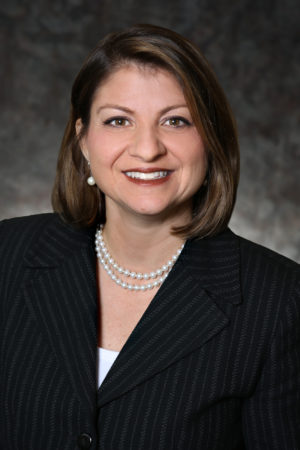
To address the growing problem, support from the Harrington Value Institute Community Partnership Fund led to the establishment of a unique collaboration between the Holloway Community Program and Westside Family Health Care, Papas said.
The relationship expands capacity to care for patients with HCV throughout the care continuum within the primary care setting.
“The Harrington Community Partnership Fund targets support to address community needs, such as eliminating barriers to health care for the disadvantaged or underserved and reducing disparities in health,” Papas said.
“This is at the heart of what the Holloway Community Program has been able to achieve, and through this new partnership among the Value Institute, the Holloway Community Program and Westside, we have the ability to move the needle on meaningful health outcomes for those at risk or living with HCV.”


